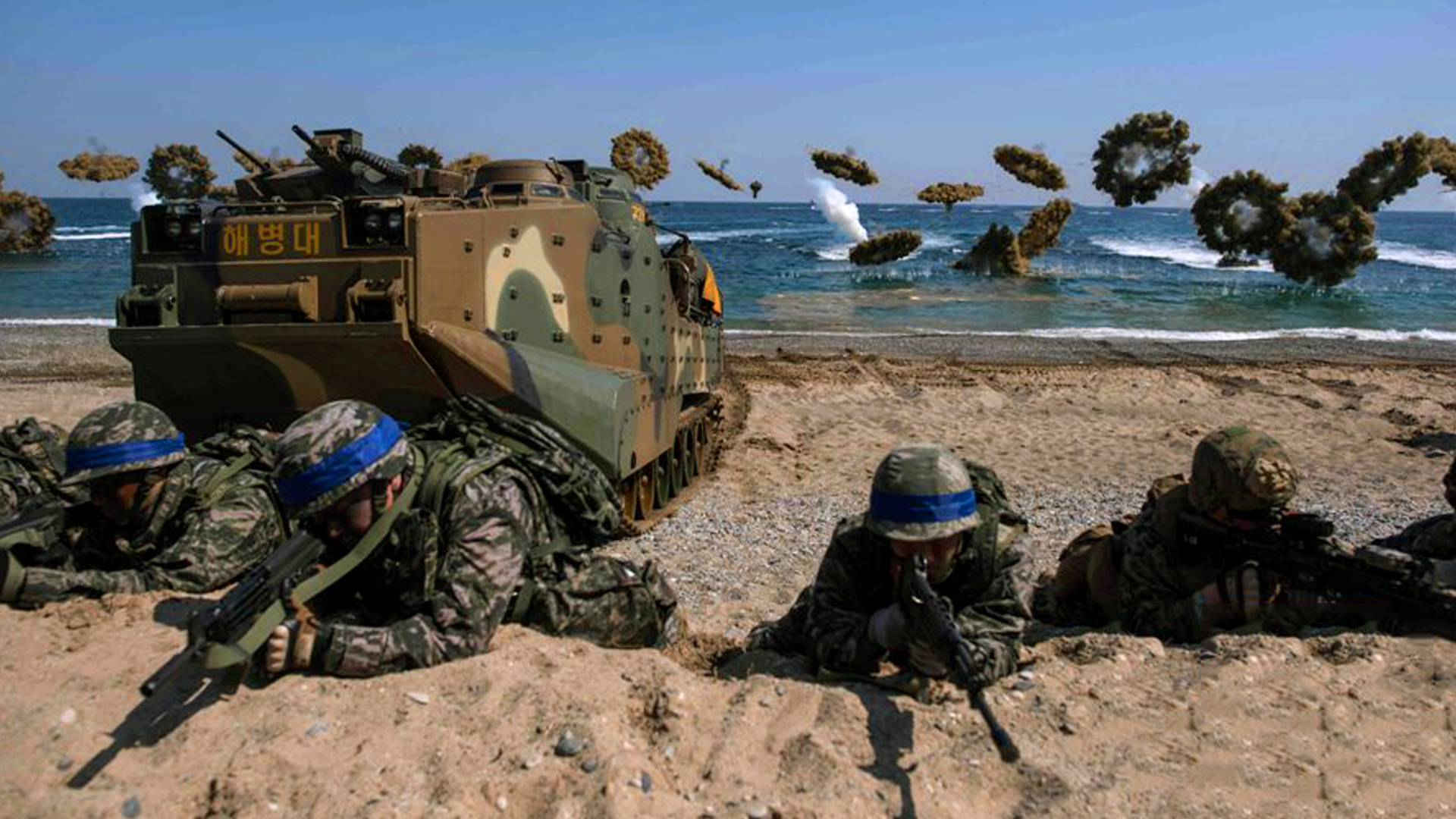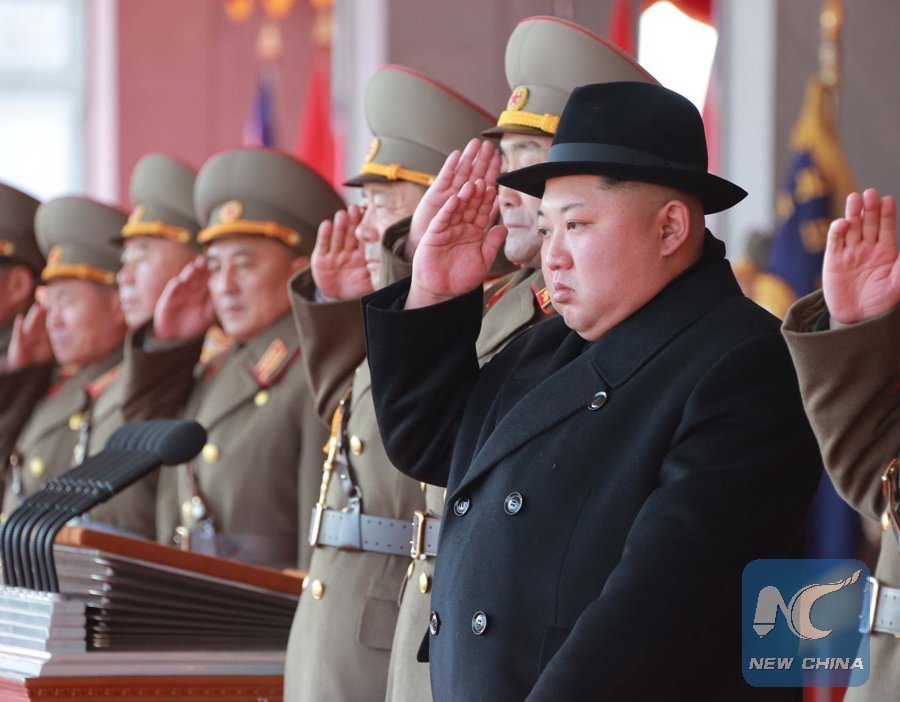
ROK and U.S. soldiers take positions during an annual joint military landing exercise in Pohang, ROK's southeast coast, March 12, 2016. /Xinhua
ROK and U.S. soldiers take positions during an annual joint military landing exercise in Pohang, ROK's southeast coast, March 12, 2016. /Xinhua
Editor's note: Gabriela Bernal is a Korean analyst and a PhD student at the University of North Korean Studies in Seoul, South Korea. The article reflects the author's opinions, and not necessarily the views of CGTN.
Despite the continued risks posed by the coronavirus as well as tense relations with the Democratic People's Republic of Korea (DPRK), the United States and the Republic of Korea (ROK) have decided to go ahead with their annual joint military summer exercises. The joint drills will take place from August 18 to 28 and are likely to worsen the already fragile state of security on the Korean Peninsula.
The joint exercises are expected to be greatly scaled back given the travel restrictions on many U.S. service members stationed in nearby Japan and in the U.S. mainland due to the coronavirus pandemic.
With the springtime military exercises canceled due to fears surrounding COVID-19, the summertime drills were also expected to be either postponed or canceled altogether. This would have been the more logical choice given the continued threat posed by the virus in the ROK, with confirmed infections among United States Forces Korea soldiers rising every week.
It is not exactly clear what both countries are aiming to achieve through these drills, as the current circumstances on the Peninsula seem ill-suited for such exercises at this time. This is not only due to the ongoing pandemic but also the recent tensions with the DPRK. Both the ROK and the U.S. have experienced a further weakening of bilateral ties with Pyongyang over the past months and such military exercises will only make things worse.
The DPRK has been opposing and publicly criticizing the joint military drills between the ROK and the U.S. for many years, accusing both countries of taking part in "war games" and preparing to launch an attack against it. The drills usually involve tens of thousands of soldiers from both sides and are reportedly aimed at ensuring military "readiness."
But the effect that such drills have on establishing positive engagement with the DPRK is extremely negative. Pyongyang views these drills as a serious threat and an impediment to peace on the Peninsula. It also severely hurts any efforts at diplomacy with Pyongyang. For the DPRK, such actions, like taking part in military drills with the U.S. soldiers, directly contradict Seoul's calls for peace and increased diplomatic relations with Pyongyang.

Top DPRK leader Kim Jong Un attending a military parade marking the 70th anniversary of the founding of Korean People's Army in Pyongyang, the DPRK, February 9, 2018. /Xinhua
Top DPRK leader Kim Jong Un attending a military parade marking the 70th anniversary of the founding of Korean People's Army in Pyongyang, the DPRK, February 9, 2018. /Xinhua
The DPRK will likely criticize the ROK and the U.S. actions publicly and blame them for further heightening tensions on the Korean Peninsula. In turn, Pyongyang can then use this as an excuse to take its own actions which could also further aggravate the situation among the three countries. In fact, given the upcoming U.S. presidential election, provocations by the DPRK should not be overruled.
In this sense, the U.S. is doing itself a disservice by holding these drills at this time given the current regional and global context as well as possible negative consequences that might come of it. Since Trump is trying to get reelected, it would have been a smarter choice to just leave the Korean issue alone for the time being and not poke the bear by unnecessarily holding these military exercises.
The summer joint drills this year do not even make sense for the ROK given how scaled down they will be. What the current ROK administration has been wanting since coming into power is to have wartime operational control (OPCON) of ROK forces returned instead of having it continue under the U.S. control. This would help ease tensions with the DPRK and enable a more independent military posture by the ROK.
However, due to the COVID-19 pandemic, the U.S. side will not be bringing the evaluators needed to determine whether conditions are being met for the transfer to take place. Thus, these summer drills will not only be hurting the U.S. and the ROK's relations with the DPRK but also won't be advancing Seoul's goal of regaining OPCON from the U.S.
Apart from this, the U.S. is only digging a deeper hole for its diplomatic efforts with Pyongyang by holding such exercises. With practically zero efforts for diplomatic engagement with the DPRK this year, Pyongyang's view of Washington is only bound to deteriorate further. This will make future diplomatic engagement all the more difficult. And this is assuming Trump wins a second term in office.
Both the ROK and the U.S. are playing a risky game by deciding to hold the joint drills despite all the risks involved. Such a move could not only put another dent in the U.S.-DPRK relations but also deal another blow to ties between Trump and Kim Jong Un.
Even if Trump manages to get reelected, it remains unclear whether Kim will be as friendly to him as he was in the past. To make matters worse, the situation will be all the more unpredictable if someone new is sitting in the Oval Office in 2021.
(If you want to contribute and have specific expertise, please contact us at opinions@cgtn.com.)